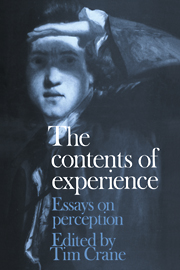Book contents
- Frontmatter
- Contents
- Preface
- Notes on contributors
- 1 Introduction
- 2 The puzzle of experience
- 3 How to interpret ‘direct perception’
- 4 Experience and its objects
- 5 Scenarios, concepts and perception
- 6 The nonconceptual content of experience
- 7 Visual qualia and visual content
- 8 The projective theory of sensory content
- 9 Sight and touch
- 10 The diversity and unity of action and perception
- References
- Index
5 - Scenarios, concepts and perception
Published online by Cambridge University Press: 22 September 2009
- Frontmatter
- Contents
- Preface
- Notes on contributors
- 1 Introduction
- 2 The puzzle of experience
- 3 How to interpret ‘direct perception’
- 4 Experience and its objects
- 5 Scenarios, concepts and perception
- 6 The nonconceptual content of experience
- 7 Visual qualia and visual content
- 8 The projective theory of sensory content
- 9 Sight and touch
- 10 The diversity and unity of action and perception
- References
- Index
Summary
Scenarios
A perceptual experience represents the world as being a certain way. What is the nature of the content it represents as holding? How is our mastery of observational concepts related to these perceptual contents? In the course of addressing these questions, I will be identifying two kinds of representational content on which we can draw in giving accounts of concepts which have peculiarly close links with perception.
The representational content of experience is a many-splendoured thing. This is true not only of the remarkable range of detail in the perceptual content, but also of the range of different, and philosophically interesting, types of content that can be possessed by a particular experience. I begin with what is arguably the most fundamental type of representational content. The sense in which this type of content is arguably the most fundamental is that representational properties of other sorts all in various ways presuppose the existence of this first type of content.
I suggest that one basic form of representational content should be individuated by specifying which ways of filling out the space around the perceiver are consistent with the representational content's being correct. The idea is that the content involves a spatial type, the type being that under which fall precisely those ways of filling the space around the subject which are consistent with the correctness of the content.
- Type
- Chapter
- Information
- The Contents of ExperienceEssays on Perception, pp. 105 - 135Publisher: Cambridge University PressPrint publication year: 1992
- 41
- Cited by



